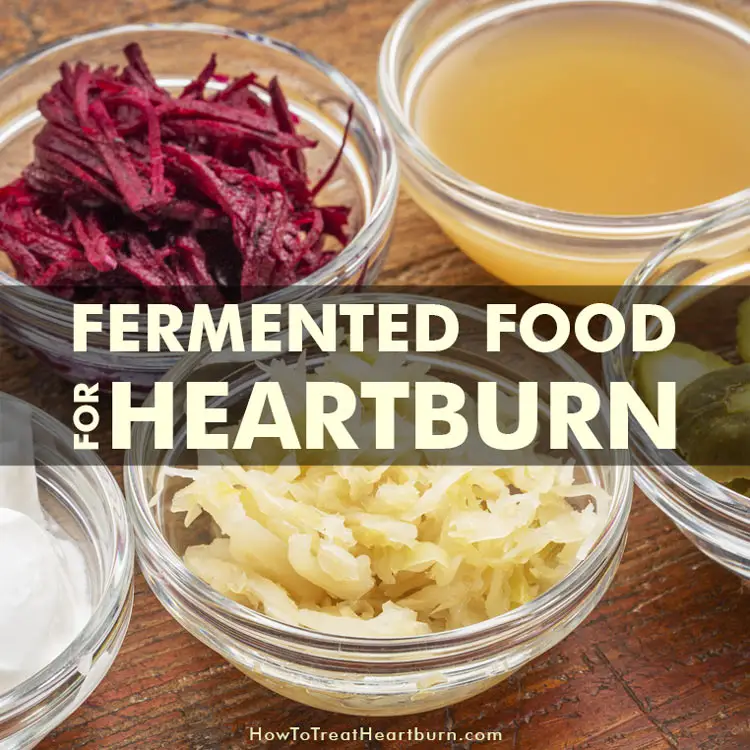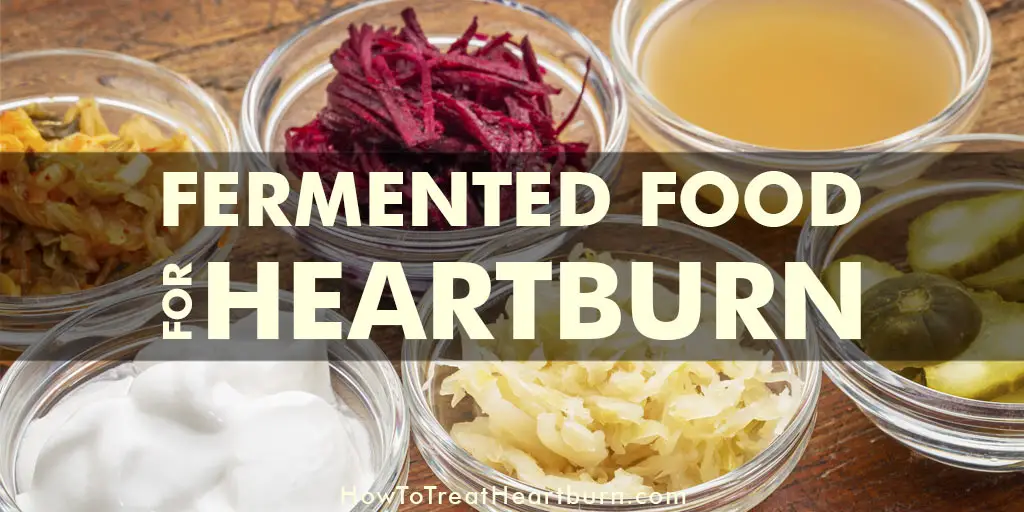Disclosure: I am compensated for purchases made through some links on this site. Click for details.
Lacto-fermented foods and beverages are beneficial in preventing the occurrence of heartburn, acid reflux, and GERD. These foods provide beneficial bacteria that help balance bowel flora to aid digestion and assimilation of food by the body.
What Is Lacto-Fermentation?
Lacto-fermentation is different from the fermentation of wine and beer. With wine and beer, yeasts are added to grape juice or grains to convert sugars into alcohol. In lacto-fermentation, the bacteria Lactobacillus is responsible for fermentation. Lactobacillus converts lactose and other sugars into lactic acid.
Lacto-fermentation enhances food by producing good bacteria called probiotics. These bacteria produce enzymes that break down food for improved digestion. The bacteria also increase vitamin levels in food. The combination of bacteria and enzymes transform nutrients making them easier to be digested and absorbed into the body.
An additional benefit is the lactic acid produced through Lacto-fermentation. It naturally preserves food. For centuries, food was preserved through Lacto-fermentation.
Lacto-Fermented Foods and Beverages
1) Lacto-Fermented Dairy
- Kefir
- Yogurt (made from whole milk with no added sugar)
- Sour cream
2) Lacto-Fermented Vegetables
- Sauerkraut
- Pickles
- Olives
- Pickled beets
- Kimchi
- Kombucha
- Beet kvass
- Natto
- Chutneys
3) Lacto-Fermented Meats
- Meats such as fish can also be fermented
Avoid Pasteurized, Irradiated or Chemically Treated Foods
Our conventional methods of food preservation have veered away from Lacto-fermentation as a form of food preservation. Most foods are pasteurized, irradiated, or chemically treated to kill off bacteria and allow for longer shelf life. This kills both good and bad bacteria. In turn, it leaves us lacking in good bacteria and allows bad bacteria that form in the gut to run rampant.
Don’t think you’re benefiting from a Lacto-fermented food if you’re buying items like yogurt, kefir, sauerkraut, pickles, or other before mentioned food from a conventional grocery. They are likely doing more harm than good. Most have no live cultures (Lactobacillus or other beneficial bacteria) and contain added sugars that feed bad bacteria already in the gut.
You may find a health food store that carries Lacto-fermented foods and beverages, but it’s more likely that you’ll have to make them yourself. If you are unable to find or make your own Lacto-fermented foods and beverages taking a high-quality probiotic is your next best choice.
Superkrauts on Amazon is one source I’ve found for raw lacto-fermented sauerkraut that’s unpasteurized and free of vinegars and preservatives.
The Process of Fermenting Food and Beverages
Don’t be intimidated by preparing Lacto-fermented foods. It is a simple process. There’s no production like canning, and no fancy equipment required. It only takes a few basic instruments along with salt, vegetables, and water. It’s easy to develop confidence making sauerkraut then venture to more creative fermentations with a variety of vegetables, fruits, or beverages.
3 Events Happen During the Process of Lacto-Fermention
- Vegetables are placed in brine at room temperature. The salt in the brine kills harmful bacteria preventing it from taking over and spoiling the food. The good bacteria, Lactobacillus, is tolerant of the salt.
- The harmful bacteria are aerobic bacteria. They require oxygen and will use up what’s available in the submerged vegetables over the first 2-3 days of the process. Lactobacillus does not need oxygen to survive.
- Lactobacillus is present on the surface of vegetables. It converts lactose and other sugars into lactic acid. The lactic acid preserves the vegetables. As an alternative to salt, you can also use whey or a vegetable starter culture to introduce good bacteria and kickstart the process. You can also use a tablespoon or so of brine from a previous ferment. It will be teeming with good bacteria.
How Lacto-Fermented Food and Beverages Prevent Heartburn
Fermented foods and beverages provide the best source of probiotics available. Probiotics are healthy bacteria that keep the digestive system functioning properly. If there aren’t enough healthy bacteria in the digestive system, bad bacteria can cause digestive conditions leading to heartburn.
The overgrowth of harmful bacteria leads to heartburn in the following ways:1,2,3
- It produces methane and hydrogen gas in the intestinal tract causing it to expand upward. The expansion causes added pressure on the stomach and thusly on the lower esophageal sphincter (LES) allowing stomach acid to reflux into the esophagus. The LES is the valve between the esophagus and stomach. It closes after swallowing to keep stomach acid and food in their proper place.
- It produces gas that can travel upward to be belched out. The pressure of the gas opens the closure of the LES. As the gas passes through, it allows acid to reflux as well.
- It causes low acid levels. Adequate acid levels in the stomach are needed to trigger the lower esophageal sphincter (LES) to close. When stomach acid levels are too low, the LES will have a weak closure allowing acid to leak into the esophagus.
- It prohibits the synthesis of certain digestive enzymes, reduces the body’s ability to break down proteins into amino acids, and prevents the absorption of nutrients. This causes the digestive process to be less efficient and slow down. The slowed digestive process causes an increase of food in the intestines. The increase pushes upward causing pressure on the stomach and LES leading to acid reflux.
“All diseases begin in the gut.” ~ Hippocrates
Let’s look at how probiotics bring balance to the digestive system and eliminate heartburn, acid reflux, and GERD. The following points are interrelated in most cases. Unfortunately, problems with the digestive system build on each other creating disease in the body. As Hippocrates stated over 2,000 years ago, “All diseases begin in the gut.”
1. Probiotics Fight Against Bacterial Infections
Lacto-fermented foods produce probiotics. These good bacteria help fight against harmful bacteria and yeast to prevent and eliminate bacterial infections such as small intestine bacterial overgrowth (SIBO), Helicobacter pylori (H. pylori)4, and candida overgrowth.
2. Probiotics Balance Stomach Acid Production
When stomach acid is at a normal level the LES is triggered to close. This helps keep stomach acid from refluxing into the esophagus. Adequate stomach acid levels also help kill harmful bacteria and break down food for absorption of nutrients.
3. Probiotics Increase the Absorption of Food and Nutrients
Healthy bacteria help break down fermented food for easier digestion. They produce short-chain fatty acids, folate, and vitamin K, and allow for an increase in the absorption of nutrients during digestion.
Easier digestion helps prevent constipation. The pressure caused by constipation can lead to added abdominal pressure which can lead to heartburn.
Certain nutrients are required for the digestive tract to function and keep bowels moving properly. If food is not broken down and absorbed properly, the bowels will slow.
4. Probiotics Boost the Immune System
Harmful bacteria can damage the mucous membrane of the gastrointestinal tract causing leaky gut, a condition where unwanted molecules pass through the intestinal wall to the bloodstream leading to immune disorders.
Eating Lacto-fermented foods and beverages provides probiotics to fight against bad bacteria to prevent leaky gut. Probiotics also help build and produce antibodies, thus boosting the immune system.
A boosted immune system is wanted to help kill off harmful bacteria in the digestive tract.
5. Probiotics Prevent Constipation
- Probiotics help prevent constipation by eliminating harmful bacteria that causes a slowing of the bowels.
- They balance stomach acid production so food breaks down properly.
- They help provide the needed nutrients to keep the digestive tract functioning properly.
- They also help maintain the muscular activity in the intestinal tract to keep food moving.
6. Probiotics Prevent Gas
Harmful bacteria in the digestive tract produce gas as a byproduct which can lead to bloating and belching. Good bacteria can keep harmful bacteria in check. Bloating and belching both weaken the closer of the LES to allow acid reflux.
7. Probiotics Reduce Stomach Fat
Being overweight causes excess pressure on the stomach and thus the LES. This pressure can be enough to cause acid reflux.
Proper bacteria levels not only help with the absorption of food and nutrients, studies also show that bacteria in the digestive tract may influence food cravings and metabolism.
Taking in Lacto-fermented foods and beverages to get probiotics may be one key to staying lean.
Drugs Aren’t Needed to Cure Acid Reflux
A proper diet of probiotic-rich foods is all that’s needed to eliminate heartburn for many people. Imagine being able to correct various digestive conditions and maintain a proper bacterial balance in the gut from ingesting Lacto-fermented foods and beverages rich in probiotics. Wouldn’t that be healthier than taking drugs for heartburn? Solve the source of the problem instead of masking heartburn.
Lacto-fermented foods and beverages hold the power to eliminate heartburn, acid reflux, and GERD by restoring the body’s natural gastric balance and function.
If fermented foods aren’t available, high-quality probiotic supplements are the next best thing.

References
1) Andrew C. Dukowicz, MD, Brian E. Lacy, PhD, MD, & Gary M. Levine, MD. “Small Intestinal Bacterial Overgrowth: A Comprehensive Review.” National Center for Biotechnology Information, U.S. National Library of Medicine, Gastroenterol Hepatol (NY), February, 2007.
2) Jan Bures, Jiri Cyrany, Darina Kohoutova, Miroslav Förstl, Stanislav Rejchrt, Jaroslav Kvetina, Viktor Vorisek, & Marcela Kopacova. “Small intestinal bacterial overgrowth syndrome.” National Center for Biotechnology Information, U.S. National Library of Medicine, World Journal of Gastroenterology, June 28, 2010.
3) Matthew A Ciorba. “A Gastroenterologist’s Guide to Probiotics.” National Center for Biotechnology Information, U.S. National Library of Medicine, Clinical Gastroenterology and Hepatology, April, 2012.
4) Matjaž Homan, & Rok Orel. “Are probiotics useful in Helicobacter pylori eradication?.” National Center for Biotechnology Information, U.S. National Library of Medicine, World Journal of Gastroenterology, August, 2001.




I’ve suffered acid reflux for 2 years but with the 8/16 eating time frame and the inclusion of fermented foods I’m able to get on top of this horrible condition. I also take Thorne GI-Encap with every meal. I’m still healing and get heartburn sometimes but it’s not as fierce and I’m off medication thank goodness.
Hey Cassie! Congratulations! Great hearing from you! Glad you have gotten your chronic acid reflux under control naturally and have gotten off the medication. It’s a great relief when you can get on top of it like you have! 😀
Hello, 2 months ago I went for a tooth implant that was a disaster from day one when i was giving Clindamycin 300 mg for 7 days, starting a day before surgery. After 3 days I started feeling a numbness in my swallowing, a knot in my throat, and difficult to swallow. I though it was a problem with the lingual nerve due to implant, the implant had to be removed due to many complications. The symptoms with my throat persisted, after a month i couldn’t taste food, my throat got worse, the pain start and I was going to many oral maxilar dr to exam the nerve, all of them didn’t think I had nerve injuries. After 6 weeks I start feeling horrible pain when I swallow it was like blades in my throat and my voice was getting weak. I went to a ENT and after a scope exame he diagnosed LPR, my throat, Pharyngal, esophageal, laryngeal was all highly inflamed. I am taking Zantac 150 2times a day for 5 days now, no improvement, i had to completely change my diet, i lost 12 lbs so far, and I am fighting to be recovered. I am not taking probiotics, what kind should I take? I make my own Kefir with whole milk, however, I am not taking it because Im not sure if it will trigger reflux. Please help.
Hello Marcia, Kefir can be good but dairy products can also cause heartburn. I’ve found it best to work kefir into the diet after acid reflux is controllable, but everyone is different. If you try kefir and feel worse after. Wait on it and focus on other probiotics. When you’re getting your digestive tract back in shape you want a variety of different probiotics. This is where high-end probiotic supplements can help. They have a great variety of good bacteria. There, however, are more good bacteria in those you can make yourself like sauerkraut just not the variety. For high-end probiotic supplements, check out the article on Probiotics for Heartburn Relief there is a section at the bottom “Popular Probiotic and Prebiotics Supplements”. Sauerkraut along with a good probiotic supplement is a great place to start. You might want to look for a homeopathic doctor to help with your LPR. Hope you feel better soon!
This is a very informative site. Thank you so much for making it. I am currently reading THE GUT HEALTH PROTOCOL, by John G. Herron where he talks about his journey to healing his gut. He addresses a lot of these points in his book.
Hello Zara! Thank you for reading and commenting. I hope our website and The Gut Health Protocol are of help to you. Best wishes!